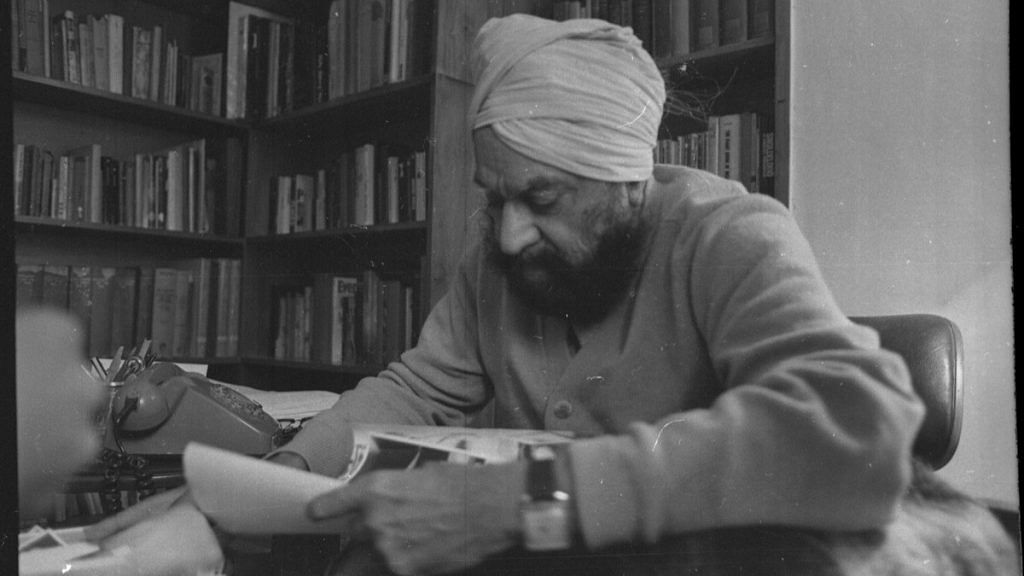New Delhi: Imagine a man in his late 70s writing several books on jokes with subtle nuances of raunchiness, but all of them best-sellers even today. And, then imagine the same old man writing A history of the Sikhs and Delhi: A Novel — both eminently readable due to their simple prose and lucid English.
His Train to Pakistan remains a must-read for everyone who wants to understand Partition.
Meet Khushwant Singh, lawyer-author-diplomat-historian-editor, who passed away on this day in 2014 at the age of 99, a few months shy of celebrating what would have been a magnificent century — a century well-lived, its journey chronicled in detail in his several books and his weekly column With Malice Towards One and All, which appeared every Saturday in The Hindustan Times (the prefix ‘The’ was dropped later during one of the several redesigns of the newspapers).
Singh certainly knew how to sell a newspaper. He turned the Illustrated Weekly of India into a best-seller, often publishing strongly-worded letters to the editors that criticised him. Needless to say, the ‘Letter to the Editor’ section became a must-read for the readers of the weekly.
Also read: Kartar Singh Duggal, the creative genius hailed as master of the Punjabi short story
A man who spoke his mind
The lapdog of the Nehru-Gandhi family, as some of his critics would snidely call him especially due to his self-proclaimed closeness with them — which continued till the death of former prime minister Indira Gandhi’s younger son Sanjay Gandhi in 1980 — Singh took stands that very few took.
In these politically-divided times when ‘award wapasi’ is seen as an affront to the nation, Singh was one of the first ones to return his Padma Bhushan in 1984 to register his protest against the entry of the Indian Army into the Golden Temple during Operation Blue Star. Decades later, he was given the Padma Vibhushan by the Manmohan Singh government.
Had Singh been alive today, he might have taken offence to the repeated attacks on India’s first prime minister Jawaharlal Nehru by senior functionaries of the BJP.
For in Nehru, Singh saw a visionary leader, who was “above prejudices of any kind: racial, religious or of caste”.
“He was an agnostic and firmly believed that religion played a very negative role in Indian society. What I admired most about him was his secularism. He was a visionary and an exemplary leader; the father of Indian constitutional democracy, of universal adult franchise, the five-year plans, giving equal rights to women, among other things,” he wrote about Nehru in his book ‘Absolute Khushwant’.
If Singh had the courage to return his award, he also had the courage to openly criticise Khalistan terrorist Jarnail Singh Bhindranwale.
But, it was his over-the-top praise of Sanjay Gandhi that, many felt, was Singh’s undoing. But, then that was how Singh always was: Completely transparent about whom he liked as well as those he disliked.
He himself admitted that he got his Rajya Sabha membership as well as his editorship of Hindustan Times for his open support to Sanjay Gandhi before and after the Emergency. In Sanjay Gandhi, he saw a leader who had the vision to transform India.
Much has been spoken and written — a lot by Singh himself — about his so-called affairs with the rich, powerful and/or beautiful women.
As a young reporter in the newspaper that he had once edited, I was granted time to meet Singh at his Kasauli (near Solan in Himachal Pradesh) cottage. I asked him about this and his response was typical of Singh: “Everything that you read, even in a newspaper, isn’t always true. But, it isn’t always untrue also.” Now figure that!
Also read: Remembering Amrita Sher-Gil, one who loved sex, art and India, and never said sorry for it
